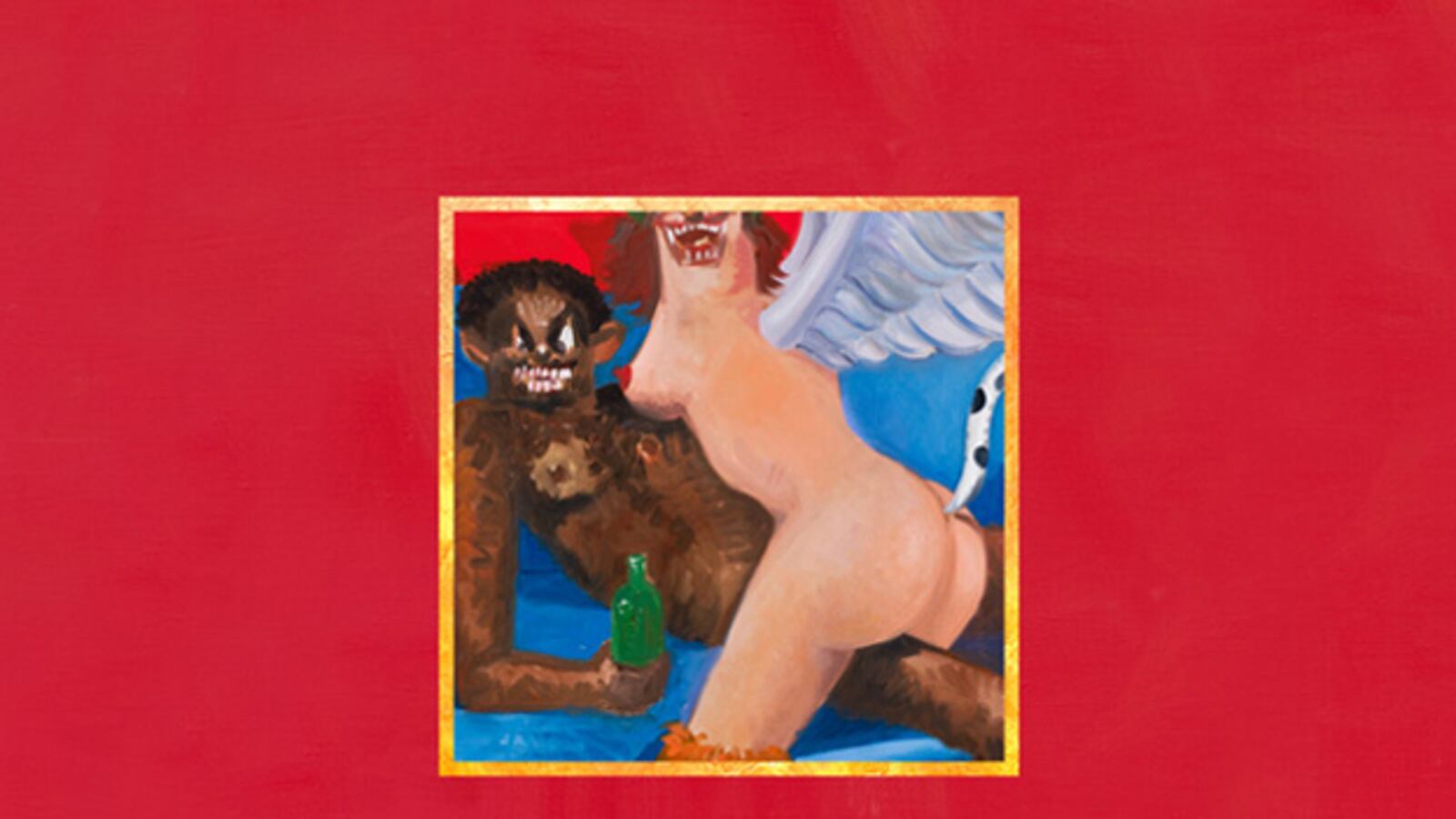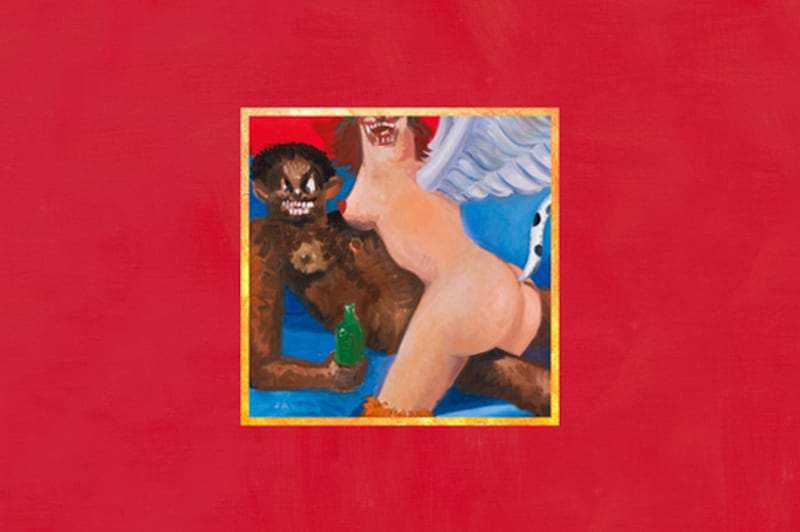
"Banned in the USA!!! They don't want me chilling on the couch with my phoenix!" tweeted an incensed Kanye West Sunday afternoon. Yes, the album cover for Kanye West's hotly anticipated album My Beautiful Dark Twisted Fantasy, depicting a werewolf-like Kanye being straddled by a nude, monster-faced female phoenix, was deemed indecent by Walmart recently. Kanye wasn't done giving the retail giant a piece of his mind, tweeting "In the 70s album covers had actual nudity... It's so funny that people forget that... Everything has been so commercialized now," before finally giving the retailer the proverbial middle finger: "In all honesty ... I really don't be thinking about Walmart when I make my music or album covers #Kanyeshrug!"

Midge Hadley, a comparatively less glamorous friend-of-Barbie doll, was originally created in 1963 by Mattel to counteract claims that Barbie was a sex symbol. In 2002, Midge was reintroduced as part of a "Happy Family" line—a married doll family consisting of husband Alan, along with kids Ryan and Nikki. However, the Midge doll was sold pregnant with Nikki—popping out a curled up Nikki when her belly is opened—and packaged without Alan, leading to complaints from Walmart's conservative clientele that it promoted teen pregnancy and sex. The doll was eventually pulled from all Walmart stores. "There's enough teenagers getting pregnant as it is. I think they're glamorizing it, and it's horrible," Jackie Ellis, 43, told USA Today. "I work in maternity and I see 10-, 11-, 12-year-olds coming in pregnant—and they're crying because they don't even know what's going on."
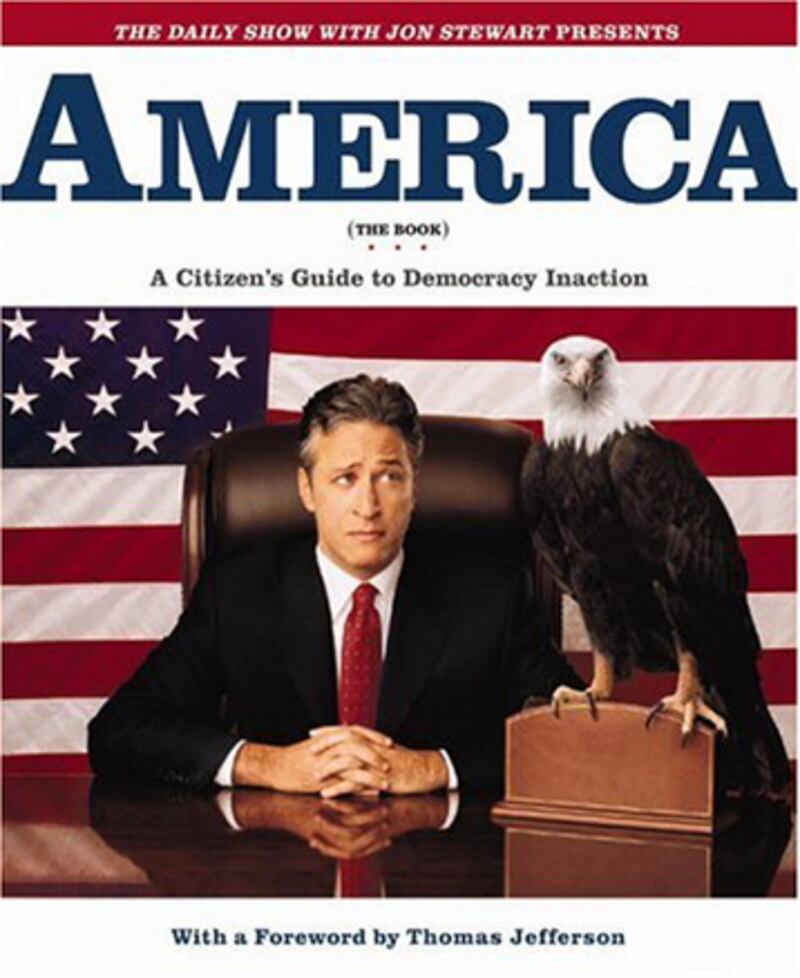
Walmart shoppers aren't always the most open-minded of people, but when Jon Stewart and his fellow Daily Show writers released this bestselling nonfiction tome that shrewdly satirized American politics, this sad fact reared its ugly head. Walmart stores canceled an order of the book in October 2004 because, on page 99, there's a section that contains clearly doctored photographs with the heads of then-current Supreme Court justices superimposed on shriveled, age-appropriate naked bodies, urging readers to "restore their dignity by matching each justice with his or her respective robe." Though the book continued to be sold online, Walmart spokeswoman Karen Burk told USA Today that "We felt a majority of our customers would not be comfortable with the image" of the naked justices. "We were hoping to be banned by a lot of mom-and-pop bookstores, but they keep selling the book," countered Daily Show executive producer Ben Karlin.

Yes, rumor has it the Transformers star has been banned from her hometown Walmart store, and no, it's not for being too sexy. The National Enquirer claims that Fox got busted for lifting a $7 tube of lip gloss from her local Florida branch during her rebellious teen years, earning her a lifetime ban from the store. "At first, Megan denied it," an unnamed friend of the actress told the tabloid. "Even after they told her they caught her on surveillance video, Megan still tried talking her way out of it. But when they threatened to call the police, Megan broke down in tears and confessed." Fox's spokesperson has refused to confirm or deny the claim.
Retna
To answer your first question: No, it wasn't because of her one-square-of-toilet-paper-per-bathroom-visit comments. Rather, when the singer-songwriter released her self-titled debut album back in September 1996, the store objected to some of the lyrics on the album's track "Love Is a Good Thing." The lyrics went: "Watch out sister/Watch out brother/Watch our children as they kill each other/with a gun they bought at the Walmart discount stores." Crow remained steadfast and, backed by her record label A&M Records, refused to change the lyrics, according to PBS NewsHour. Walmart responded by refusing to carry the record.

Apparently, Walmart isn't buying what McLovin's selling. When the Special Edition DVD of the teen coming-of-age comedy Superbad was released as a potential stocking stuffer in December 2007, it contained a novelty copy of McLovin's fake ID from the state of Hawaii. Even though the clearly fabricated ID card's photo was a hologram that switched from "Fogell" to "McLovin," Honolulu Mayor Mufi Hannemann wasn't thrilled with its inclusion, and the DVD was banned from all seven Hawaii Walmart stores, reported Gizmodo. Good luck getting laid now, horny Hawaiian teens!

In one of the more overt displays of its conservative mind-set, Walmart ruled that it wouldn't carry the "morning-after" pill Preven at any of its pharmacies in 1999. The company didn't give any reason why they wouldn't carry the drug other than calling the ban a "business decision," according to CBS News. The New York Times later reported that the anti-abortion group Pharmacists for Life International had asked Walmart to ban the drug. However, the retail giant was forced to reverse their decision in 2006 and carry the Plan B morning-after pill following a lawsuit filed by three Massachusetts women against the company, reported CBS News.
Joe Raedle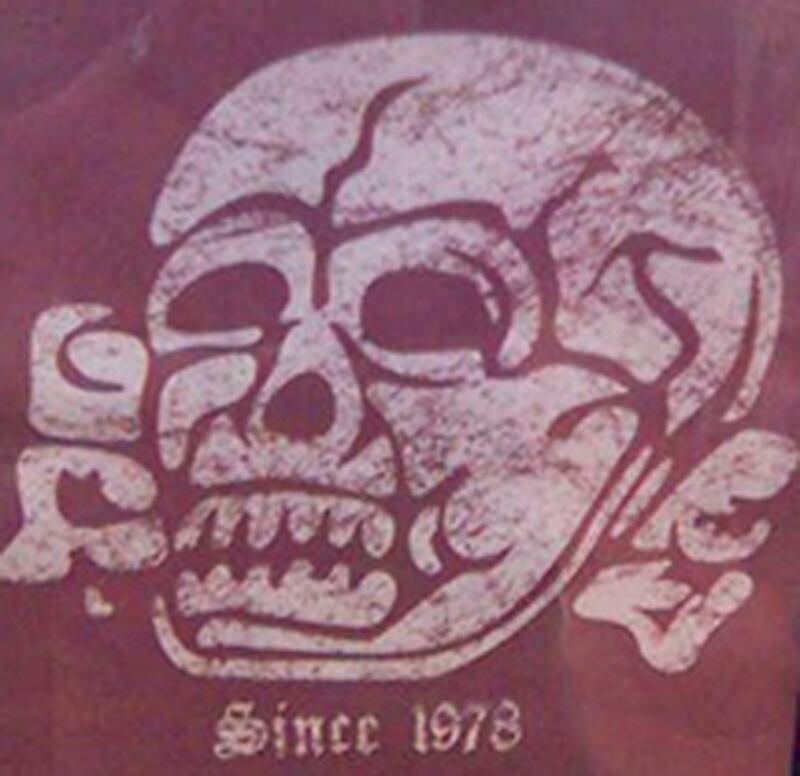
Oops. After an astute blogger accused the retail chain of selling a line of T-shirts bearing Nazi iconography back in 2006, the store immediately apologized and removed the T-shirts from its stores. The T-shirts had a primitive-looking skull and crossbones symbol on the chest—also known as the "Death's Head" insignia of the Nazi's 3rd SS Division Totenkopf. "Respect for the individual is a core value of our company and we would never have placed this T-shirt on our shelves had we known the origin and significance of this emblem," Walmart spokesman David Tovar told the Associated Press. Despite the public apology, The Consumerist spotted the controversial T-shirts being sold for $3 apiece in the discount section of a Palmdale, California, Walmart over a year after the alleged recall.
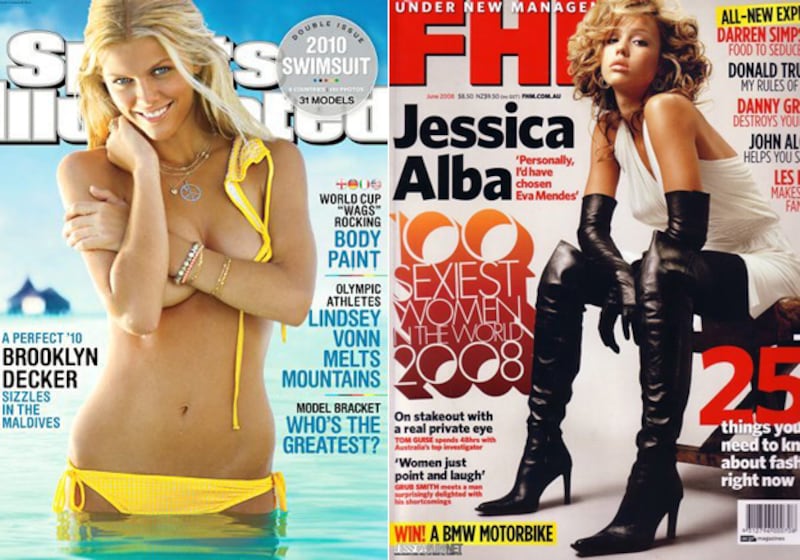
Sex sells, just not at Walmart. In 2003, Walmart decided to stop selling men's magazines Maxim, Stuff, and FHM. Even though Walmart had been carrying Maxim for over three years prior to the ban, The New York Times reported that the company came under increased pressure from Christian groups to ban the magazines from its stores. The company made the decision after "listening to our customers and associates," a Walmart spokesman told The New York Times, adding, "I know we've heard on at least one of those magazines, they weren't pleased with the offering." Later that year, the retailer chose to partly obscure the covers of Cosmopolitan, Marie Claire, and Redbook on store shelves due to "customer concerns," reported The Guardian.

Walmart has never considered Marilyn Manson one of its beautiful people, banning all of the singer's albums from its stores. Their rationale seems to be based solely on the controversy surrounding the singer, leading Manson to embark on a life-long crusade against the retailer, including paying a visit to one of their Mississippi-area stores in his mini-documentary The Death Parade—a DVD supplement to his 2002 concert film Marilyn Manson: Guns, God, and Government World Tour. "Walmart shapes ideas. They affect mind-sets. They influence cultural perspectives," fumed The San Francisco Chronicle. "This is frightening and wrong. They ban (or "sanitize") the latest Marilyn Manson CD? They don't carry Maxim? Then for 100 million benumbed Walmart regulars, Marilyn and Maxim might as well not even exist. Why not choose a nice issue of, say, Guns & Ammo and the new Shania Twain instead? There there, Timmy. Now hush up and let Daddy buy some bullets and a vat of Cheez Doodles."
AP Photo
Add anti-Semitism to the laundry list of complaints against Walmart. In 2004, the retail chain carried the anti-Semitic forgery The Protocols of the Elders of Zion in its online catalog, with the online description of the item suggesting it might be the genuine article. This led the Anti-Defamation League's Abraham Foxman to fire off an angry missive to Walmart demanding that the item's website description be altered. "I'm all for the First Amendment and making it available and giving it some context," Marc Levin, director of the documentary The Protocols of Zion, told Moviefone. "Walmart, on the other hand, presented it straight and sold it online without any sort of indication that the book [which was devised by the Czarist Russian secret police] had been debunked or used by Hitler as propaganda."

Walmart has long banned the sale of any CD containing the dreaded "Parental Advisory" label warning against harsh language, forcing musicians to sell edited versions of their CDs at their retail stores. When Green Day released their 2009 album 21st Century Breakdown, Walmart demanded the band edit the album for language in order for it to be carried in their stores. Green Day wasn't having it. "Walmart's become the biggest retail outfit in the country, but they won't carry our record because they wanted us to censor it," frontman Billie Joe Armstrong told The New York Times. "They want artists to censor their records in order to be carried there... we just said, 'No.' We've never done it before. You feel like you're in 1953 or something." Despite the ban, the album debuted at No. 1 on the Billboard charts, and was one of the year's top-selling albums, moving 2,657,000 copies.

Just one week after instituting a ban on The Daily Show's satirical tome America (The Book), the retail giant returned its order of 3,500 copies of comedian George Carlin's book When Will Jesus Bring the Pork Chops? The cover of the book had a painting recreating The Last Supper—except Jesus' seat is empty, and Carlin (an atheist) is seated next to it raising an eyebrow. Walmart representatives blamed the whole thing on an ordering mishap. "We did not order this book. It was shipped to us in error by one of our distributors," Walmart spokeswoman Karen Burk told The New York Post. Guess they probably don't agree with Carlin's "religion is bullshit" shtick.
